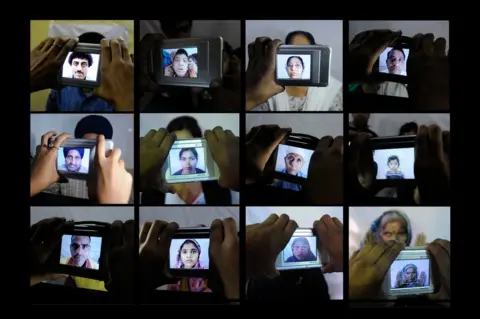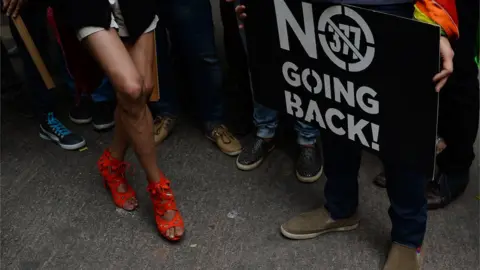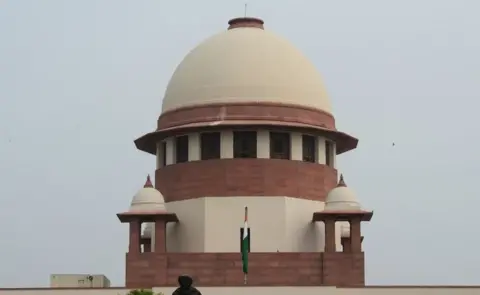How significant is India's landmark privacy judgement?
 Mansi Thapliyal
Mansi ThapliyalIn many ways, Thursday's Supreme Court ruling that Indians have a fundamental right to privacy is one of country's most significant judgements in the last two decades.
By ruling that the right to privacy is "an intrinsic part of Article 21 that protects life and liberty", the verdict overturned two previous rulings by the top court which said privacy was not a fundamental right.
Many believe the ruling has immediate implications for the government's vast biometric ID scheme, covering access to benefits, bank accounts and payment of taxes.
Also, the verdict espouses a set of beliefs and lays down the groundwork for scrapping a controversial 2013 ruling by the top court, that upheld a law criminalising gay sex. (Last year, the court agreed to revisit the judgement.) It provides a boost to petitioners for LGBT rights. It says you cannot compel people to incriminate themselves when accused of an offence, something common in India.
"The sheer sweep means the judgement will become a reference point in a lot of areas of law," leading lawyer Rebecca John told me. "I think it will have far reaching implications on Indian life."
At a time when many Indians worry that some of their essential private freedoms are under threat - the right to eat what you want, and the way you want to dress, for example - the judges offer some stirring passages in what is a largely a cogent and well-researched 547-page verdict:
- Privacy includes at its core the preservation of personal intimacies, the sanctity of family life, marriage, procreation, the home and sexual orientation. Privacy also connotes a right to be left alone. Privacy safeguards individual autonomy and recognises the ability of the individual to control vital aspects of his or her life. Personal choices governing a way of life are intrinsic to privacy. Privacy protects heterogeneity and recognises the plurality and diversity of our culture.
- Liberty and freedom are values which are intrinsic to our constitutional order. But they also have an instrumental value in creating conditions in which socio-economic rights can be achieved. India has no iron curtain. Our society prospers in the shadow of its drapes which let in sunshine and reflect a multitude of hues based on language, religion, culture and ideologies.
- Liberty enables the individual to have a choice of preferences on various facets of life including what and how one will eat, the way one will dress, the faith one will espouse and a myriad other matters on which autonomy and self-determination require a choice to be made within the privacy of the mind.
- Sexual orientation is an essential attribute of privacy. Discrimination against an individual on the basis of sexual orientation is deeply offensive to the dignity and self-worth of the individual. Equality demands that the sexual orientation of each individual in society must be protected on an even platform.
 AFP
AFPThe judgement is, in parts, a rousing philosophical articulation of the right to privacy and the importance of an independent, dignified life for the individual. The verdict is remarkable because, as scholar Pratap Bhanu Mehta told me, it "asks us to look at a system of rights as an interconnected whole" rather than dealing with them in isolation.
What appears to be less clear are the implications the judgement will have on the use of state power in collecting personal information. For one, it recognises that there are compelling state interests in collecting such information.
It talks about a "careful and sensitive balance between individual interests and legitimate concerns of the state" like national security, prevention and investigation of crime and ensuring social welfare benefits reach those they are intended for, a point seized upon by the ruling BJP government in its response to the judgement. The verdict supports a "careful balancing of the requirements of privacy coupled with other values which the protection of data sub-serves together with the legitimate concerns of the state".
These caveats raise a number of questions.
 AFP
AFPHow will be the biometric ID card-based litigations be adjudicated in the light of Thursday's verdict? (A smaller bench will now look into the validity of the Aadhaar scheme, the largest biometric identity scheme in the world.) Will the state agencies will be given carte blanche to make this data mandatory to access benefits? What about the information that has already been collected and shared across databases? How do you balance competing public and private interests when the government links the ID to tax returns to supposedly prevent fraud and evasion and private mobile networks using the ID to sign up consumers? Also, what about media intrusion into public lives?
"What India still needs is a detailed and transparent information architecture detailing which agency or vendor shares what information with whom, and a proper privacy architecture and how you can protect yourself if the state messes with your identity," says Dr Mehta, former president of India's Centre for Policy Research think-tank and now vice-chancellor of Ashoka University.
"And, to be fair, that's not something that the court can adjudicate upon."
Many believe Thursday's judgement is a wake-up call for the government. They want it to stop treating privacy with a cavalier casualness and realise it is a matter of crucial importance. India's top court has finally given a legal basis for all privacy-related challenges.
